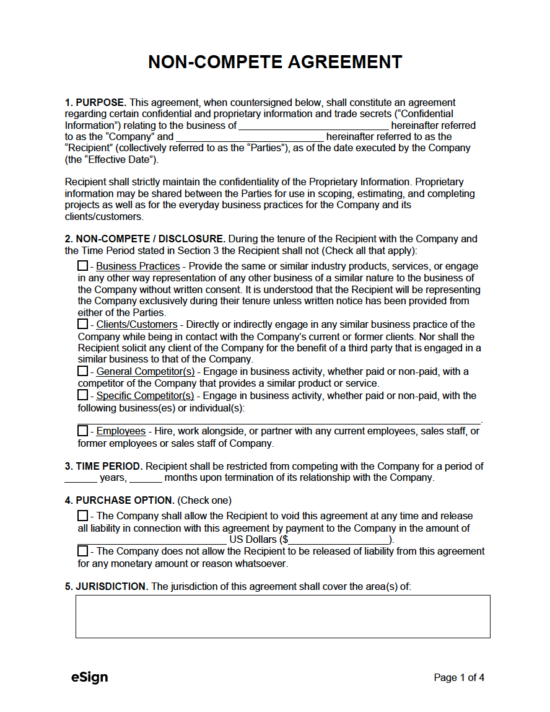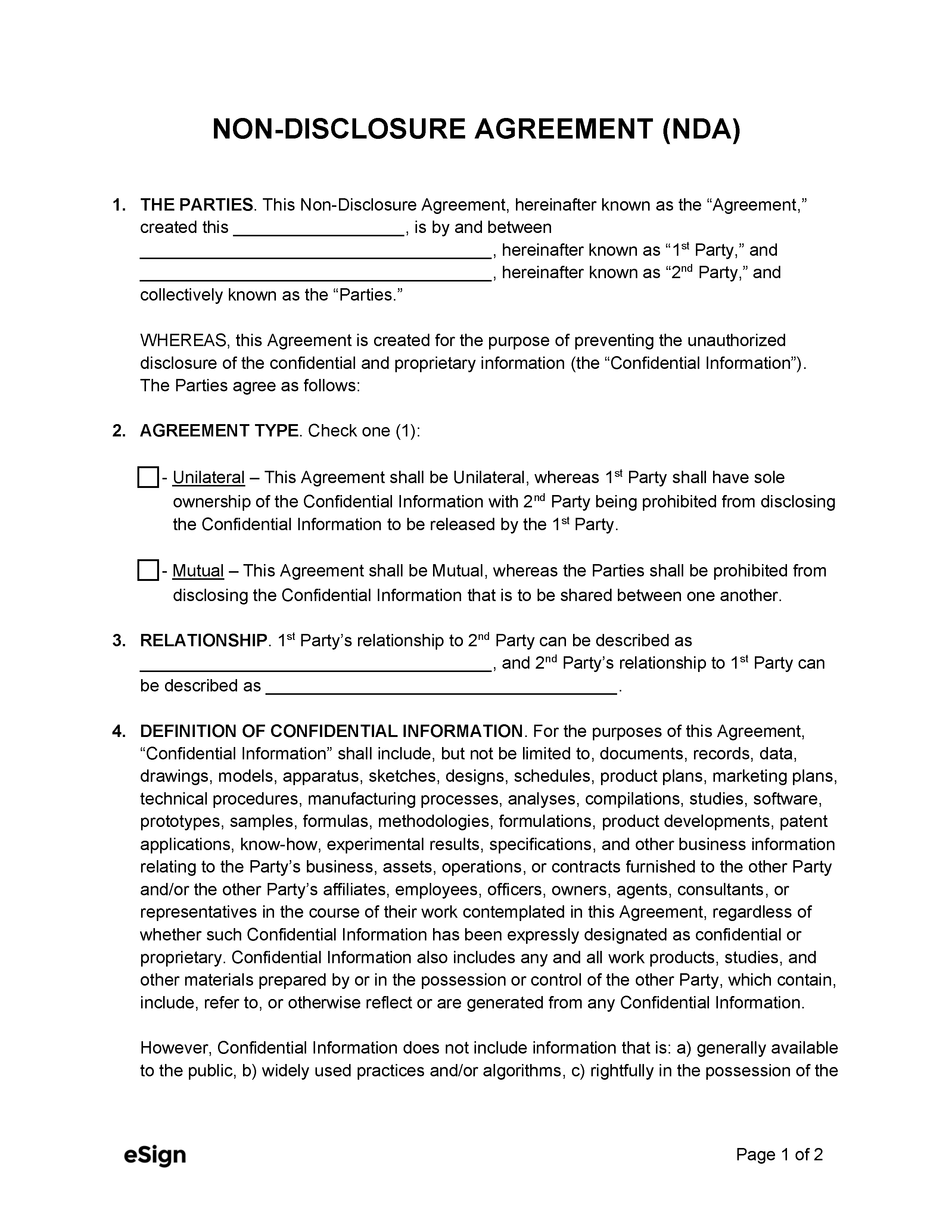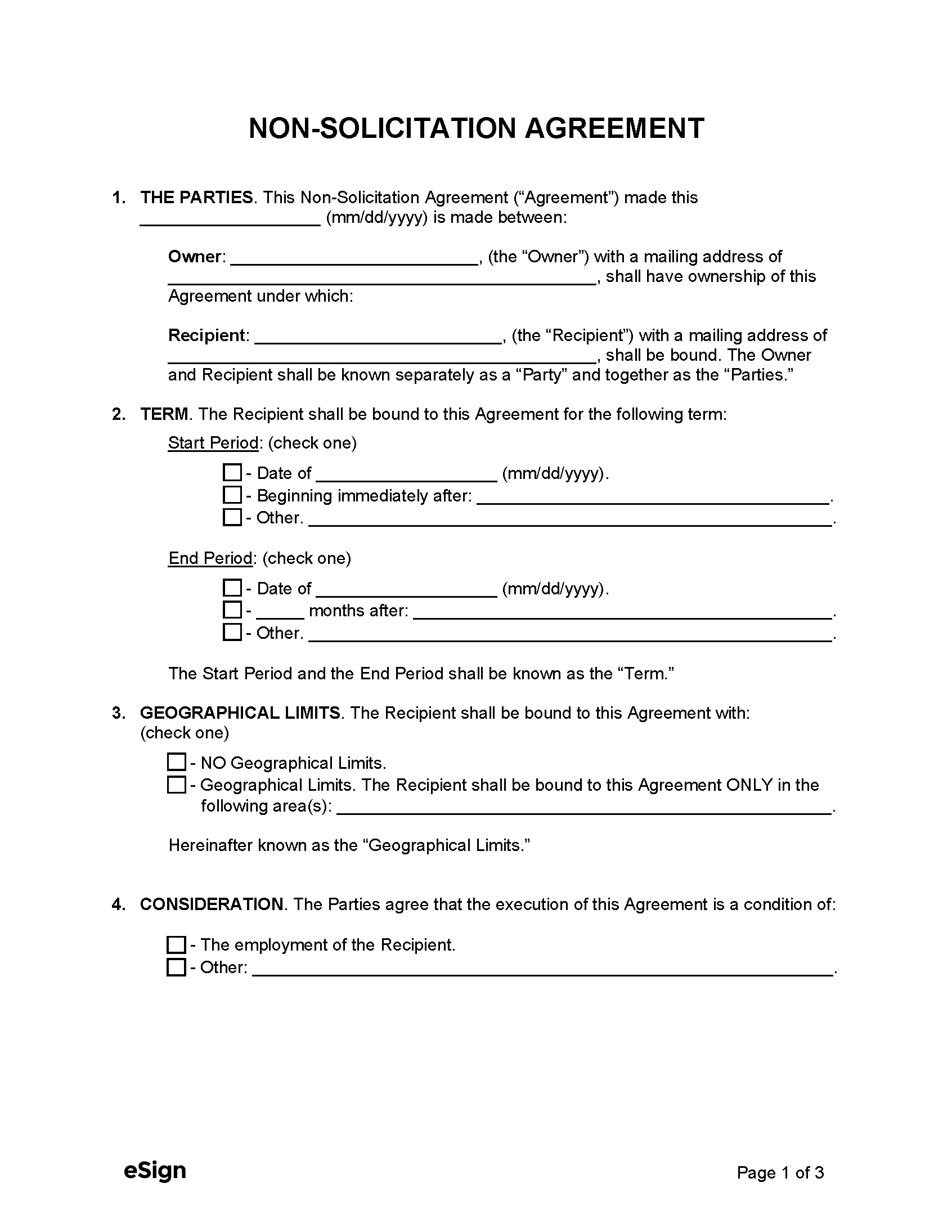Overview
- Prevents a person from “stealing” customers or employees away from a company.
- Can exist as a standalone contract or as a clause within a larger form.
- Common in sales and executive teams.
By State
- Alabama
- Alaska
- Arizona
- Arkansas
- California
- Colorado
- Connecticut
- Delaware
- Florida
- Georgia
- Hawaii
- Idaho
- Illinois
- Indiana
- Iowa
- Kansas
- Kentucky
- Louisiana
- Maine
- Maryland
- Massachusetts
- Michigan
- Minnesota
- Mississippi
- Missouri
- Montana
- Nebraska
- Nevada
- New Hampshire
- New Jersey
- New Mexico
- New York
- North Carolina
- North Dakota
- Ohio
- Oklahoma
- Oregon
- Pennsylvania
- Rhode Island
- South Carolina
- South Dakota
- Tennessee
- Texas
- Utah
- Vermont
- Virginia
- Washington
- West Virginia
- Wisconsin
- Wyoming
Contents |
What is a Non-Solicitation Agreement?
A non-solicitation agreement is a restrictive agreement that, once signed, bars an employee from poaching a business’s personnel, contractors, customers, or clients after leaving the company. The agreement can be used as a standalone contract or as a clause within a broader agreement, such as an NDA or non-compete.
When to Use
Many employers include non-solicitation clauses or standalone agreements in the onboarding process for every employee. While this type of “blanket” protection is technically permitted, many states require non-solicitation agreements to cover a specific business interest. Examples include customer relationships, client lists, and specialized training provided to employees.
The following are situations in which the agreement can be used:
- To prevent the owner of a company from taking key employees after a sale or dissolution.
- To prevent employees with access to confidential client lists from soliciting the clients post-employment.
- To prevent an employee with a new business from poaching existing staff.
- To retain employee-created patents, trade secrets, and other valuable data (must be established beforehand that all employee-created items are company-owned).
Non-Solicitation vs. Non-Compete
Both non-solicitation and non-compete agreements are employment contracts designed to restrict an employee’s ability to disrupt a business’s competitive advantage.
Of the two, non-compete agreements are considerably more restricting. The form prevents employees from working in a specific industry or with specific competitors following the end of employment. Non-competes will often specify the geographic area it affects (such as a city, state, or another territory) and the length of time the employee will be bound to it (e.g., 2 years).
Because non-compete agreements directly affect a person’s ability to work and make a living, they are considerably more difficult to enforce in a court of law. Whereas the courts generally favor non-solicitation agreements as they do not interfere with where (or with whom) an employee works following their termination.
Importance of Consideration
In order to be enforceable, all contracts must have consideration. Consideration is anything of value provided in exchange for signing a contract. Nearly all state laws consider employment as valid consideration, as long as the form is signed at the time of hiring. Mid-term agreements, which are contracts signed by existing employees, could potentially involve additional consideration, which can come in the form of money, vacation days, or another type of reward or benefit.
Laws: By State
Note: Nearly all states require non-compete and non-solicitation agreements to be reasonable. This includes having an explicit purpose, avoiding overly broad terms, and containing limited scope and duration.
LEGEND:
- ✓ – Permitted
- X – NOT Permitted
- ? – Unclear
- EMPL? = If Employee Non-Solicitation agreements are permitted in the state
- CUST? = If Customer Non-Solicitation agreements are permitted in the state
| STATE | EMPL? | CUST? | ENFORCEABILITY | STATUTES |
| AL | ✓ | ✓ | Restrictive covenants must comply with Alabama statutes. | § 8-1-190 |
| AK | ✓ | ✓ | No NSA-specific enforceability requirements. | Not applicable |
| AZ | ✓ | ✓ | Enforceable to protect customer relationships, confidential information, and other trade secrets. | Not applicable |
| AR | ✓ | ✓ | Enforceability varies between customer and employee non-solicitation agreements. | Not applicable |
| CA | ? | ? | Generally prohibited, but may be enforced in rare instances. | § 16600 |
| CO | ? | ✓ | Customer non-solicitation agreements are only enforceable against highly paid workers. | § 8-2-113(2)(d) |
| CT | ✓ | ✓ | Must comply with Connecticut’s non-compete laws. | Not applicable |
| DE | ✓ | ✓ | Enforceable under common law requirements for non-competes. | Not applicable |
| FL | ? | ✓ | Must protect customer relationships or other legitimate business interests. | §§ 542.33 – 542.335 |
| GA | ✓ | ✓ | Terms must be reasonable in protecting a legitimate business interest. | § 13-8-50 & § 13-8-53 |
| HI | ✓ | ✓ | Enforceable if compliant with laws on restrictive covenants. | § 480-4 |
| ID | ✓ | ✓ | Can only be enforced against “key” employees or contractors. | § 44-2701 – § 44-2704 |
| IL | ✓ | ✓ | Enforceable if the restricted party earns more than $45,000. | 820 ILCS 90/10(b) & (c) |
| IN | ✓ | ✓ | Enforceable if reasonable and necessary to protect a valid interest. | Not applicable |
| IA | ? | ✓ | May be enforced under Iowa common law. | Not applicable |
| KS | ? | ✓ | No enforceability requirements mentioned in state statutes. | Not applicable |
| KY | ✓ | ✓ | Enforceable under Kentucky common law. | Not applicable |
| LA | ✓ | ✓ | Cannot exceed two (2) years after the restricted party’s termination or departure. | RS § 23:921 |
| ME | ✓ | ✓ | Cannot be executed between two (2) employers. | Not applicable |
| MD | ✓ | ✓ | Examined like non-competes. | Md. Code, Lab. & Empl. § 3-716 |
| MA | ✓ | ✓ | Must be reasonable as determined by a court of law. | § 24L(a) |
| MI | ✓ | ✓ | Enforced less stringently than non-competes. | § 445.774a |
| MN | ✓ | ✓ | Enforced less stringently than non-competes. | Not applicable |
| MS | ✓ | ✓ | Terms must be reasonable. | Not applicable |
| MO | ✓ | ✓ | Must protect employer interests or last no more than one (1) year. | § 431.202 |
| MT | ✓ | ✓ | Courts don’t look favorably on restrictive agreements for employees. | § 28-2-703 |
| NE | ✓ | ✓ | Only applies to customers the employee worked with. | Not applicable |
| NV | ✓ | ? | Invalid if the customer/employee initiates contact. | § 613.195(2)(b) |
| NH | ✓ | ✓ | The agreement’s terms must be reasonable. | Not applicable. |
| NJ | ✓ | ✓ | Analyzed as non-compete. | Not applicable |
| NM | ✓ | ✓ | Must protect employer’s interests. | Not applicable |
| NY | ✓ | ✓ | Analyzed as non-compete. | Not applicable |
| NC | ✓ | ✓ | Analyzed as non-compete | § 75-2 |
| ND | ✓ | X | No NSA-specific enforceability requirements. | Not applicable |
| OH | ✓ | ✓ | Enforceable under common law requirements for non-competes. | Not applicable |
| OK | ✓ | ✓ | Non-solicitation agreements are enforceable in accordance with state law. | Title 15, § 219A and § 219B |
| OR | ✓ | ✓ | Specifically excluded from state law requirements; enforced by common law. | § 653.295(5)(b) |
| PA | ✓ | ✓ | Non-solicitation generally falls under non-compete common law. | Not applicable |
| RI | ✓ | ✓ | Specifically excluded from state law requirements; enforced by common law. | § 28-59-2(8)(i)+(ii) |
| SC | ✓ | ✓ | Non-solicitation falls under non-compete laws. | Not applicable |
| SD | ✓ | ✓ | Cannot exceed two (2) years past employment date. | §§ 53-9-8 to 53-9-12 |
| TN | ✓ | ✓ | Non-solicitation falls under non-compete laws. | Not applicable |
| TX | ✓ | Non-solicitation falls under non-compete laws. | § 15.50, § 15.51, & § 15.52 | |
| UT | ✓ | ✓ | Not mentioned in state statutes. | Not applicable |
| VT | ✓ | ✓ | No NSA-specific enforceability requirements. | Not applicable |
| VA | ✓ | ✓ | Non-solicitation falls under non-compete laws. | Not applicable |
| WA | ✓ | ✓ | Analyzed as a non-compete. | Not applicable |
| WV | ✓ | ✓ | Analyzed as a non-compete. | Not applicable |
| WI | ✓ | ✓ | Non-solicitation falls under non-compete laws. | § 103.465 |
| WY | ✓ | ✓ | Non-solicitation falls under non-compete laws. | Not applicable |
Sample Non-Solicitation Clause
A non-solicitation clause can be added to an existing employment contract to prevent the need to sign two (2) separate agreements. The following is a sample clause that can be customized to the needs of the employer:
Related Forms (2)
Non-solicitation agreements are often paired with the following forms:

Download: PDF, Word (.docx), OpenDocument

Download: PDF, Word (.docx), OpenDocument

